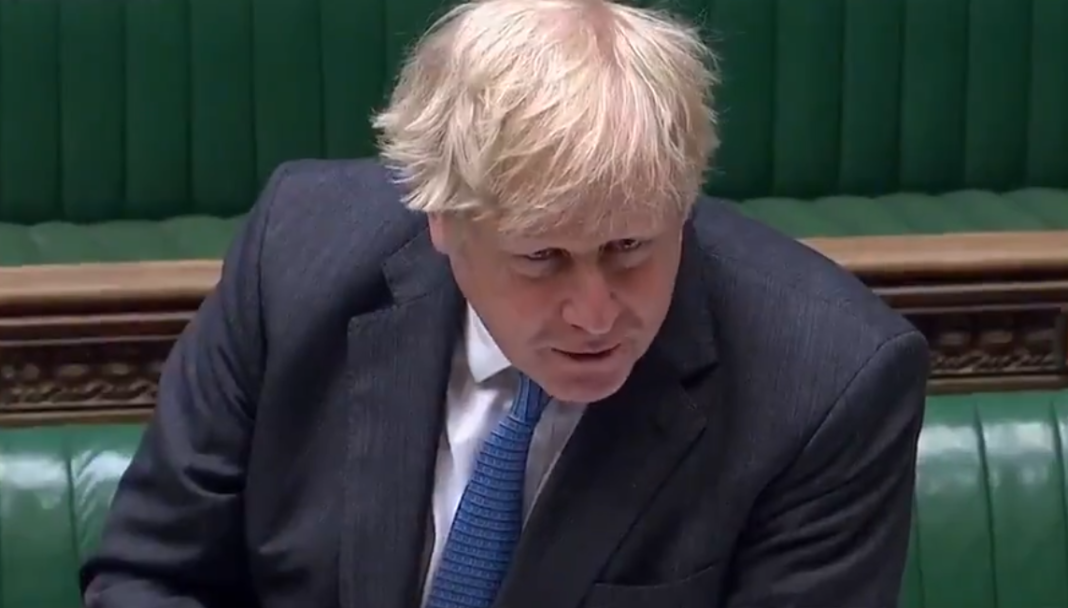28 April 2021 | ANALYSIS
“I think Boris will struggle today.”
That was the message I sent to the Wolves of Westminster group chat around three hours before Boris Johnson and Sir Keir Starmer went toe-to-toe at this week’s Prime Minister’s Questions.
I certainly wasn’t alone.
Following The Daily Mail‘s “Boris on the Ropes” headline, it would seem that most political journalists and commentators envisaged the Leader of the Opposition landing a knockout blow against a Prime Minister who had been boxed into a corner of sleaze and cronyism.
And at first, it went from bad to worse as one of Boris’ Brexit disciples, Andrea Jenkyns, was unable to ask her scripted softball question to the Prime Minister because of that wretched mute button.
As the Labour leader rose to the despatch box, I sensed an imminent pummelling for the Prime Minister, as if Johnson were a featherweight sparring a heavyweight. But given both men are estimated to be no taller than 5 feet 8, I should have realised it was more likely to go all twelve rounds.
Unsurprisingly, Starmer opened the bout with a jab against the comments Johnson reportedly made about preferring that “bodies pile high” rather than plunging the nation into its second lockdown.
“Can the Prime Minister tell the House categorically, yes or no, did he make those remarks or remarks to that effect?”, asked the Labour leader.
Johnson replied, “No, Mr Speaker”, before challenging the ex-lawyer to “substantiate” these allegations if he was going to repeat them in the Commons chamber.
But the Prime Minister wasn’t finished just yet.
Rather than throwing in the towel, Johnson added: “Lockdowns are miserable, lockdowns are appalling things to have to do, but I have to say I believe we had absolutely no choice.”
Then Starmer, to a chorus of jeers and gasps, said: “Well, somebody here isn’t telling the truth.” He then highlighted that the Ministerial Code expects those who “knowingly mislead Parliament” to “offer their resignation”.
The Prime Minister leapt out from the blue corner in defence against the implicit suggestion he should tender his resignation and lambasted Starmer for his own record in Parliament.
“It was only a few weeks ago,” Johnson reminded the Commons, “that he said he didn’t oppose this country leaving the European Medicine Agency.”
An issue that Johnson was happy to add Starmer was “forced to retract”.
On the costly renovations made to Johnson’s flat in Number 11, an area where the momentum turned in Starmer’s favour, the Labour leader gave the Prime Minister “four options”.
“Either the taxpayer paid for the invoice, or it was the Conservative Party, or it was a private donor, or it was the Prime Minister.”
“I have covered the costs,” Johnson replied.
But Johnson’s tactics were becoming clear: make it seem the Labour leader just wanted to score party political points.
“What people want to know,” the Prime Minister insisted, “is what plans a Labour government might have to improve the lives of people in this country.”
“This is a Government that gets on with delivering on the people’s priorities, while he continually raises, I think, issues that most people would find irrelevant to their concerns.”
He even pointed out that Labour councils charge their Band D residents £93 more than their Tory counterparts.
In contrast, Starmer kept plugging away with his predictable but effective jabs against Johnson’s flat renovations.
Yet the Prime Minister kept stonewalling.
After several minutes of grappling with the Labour leader, Johnson managed to break free and the gloves came off.
“He has half an hour every week,” Johnson exclaimed, “to put serious and sensible questions to me about the state of the pandemic, about the vaccine roll-out, about what we’re doing to support our NHS, about what we’re doing to fight crime, about the economic recovery… and he goes on and on about wallpaper, when I’ve told him umpteen times I’ve paid for it!”
Starmer could only reply again by accusing the Prime Minister of being “Major Sleaze”.
But Johnson was not pulling his punches, perhaps in a sign that the Labour leader was getting under his skin.
The red-faced Prime Minister roared: “Last week, he came to this chamber and he attacked me for talking to James Dyson about ventilators when we’re now sending ventilators to help the people of India, and the following day… the Labour Front Bench said any Prime Minister would have done exactly the same thing.”
And Johnson, who had undoubtedly bobbed and weaved off the ropes, even managed to land a few final blows. He defended Kate Bingham, the vaccine tsar who has helped in Britain’s roll-out, from Labour’s accusations that she was “a crony”. He also lauded the introduction of tougher sentences for violent and sexual offenders before pointing out that the Shadow Front Bench had opposed them, and even managed to champion Brussels for their approval of his Brexit deal.
A depleted Commons was left acclaiming Johnson’s fight-back.
All in all, Starmer’s attempts at the old one-twos of sleaze and cronyism failed to drop the boxed in Prime Minister, even if he was at times forced to grapple with the Labour leader.
We will now have to wait until next Thursday, when millions of Britons can go to the polls, to find out who won this week’s bout.


























